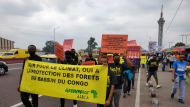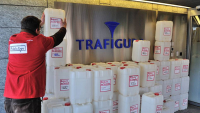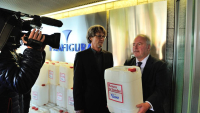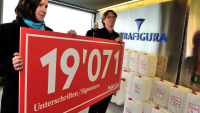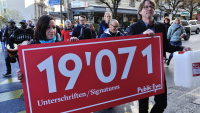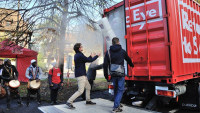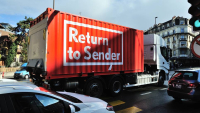Company – Active
This profile is actively maintainedBankTrack
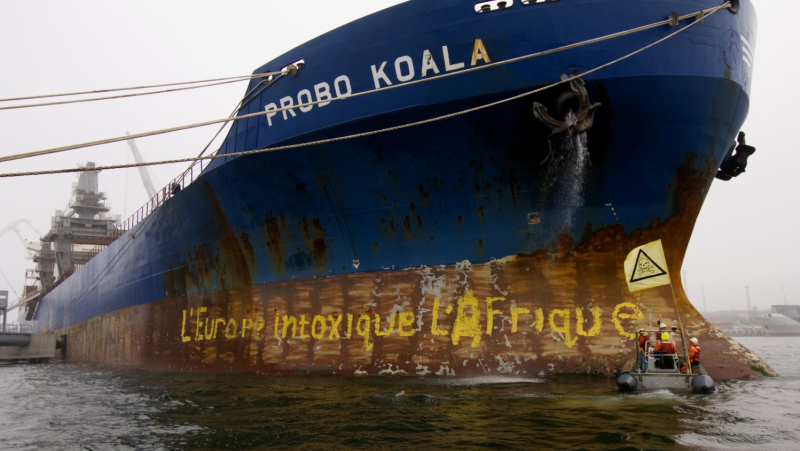
Company – Active
This profile is actively maintainedBankTrack
Why this profile?
Oil and metals trader Trafigura has been repeatedly been involved in controversial activities which have damaged climate, nature and human rights. In 2025 it signed an agreement with the Democratic Republic of Congo (DRC) to support the expansion of the country’s fossil fuel industry. It has also been a major trader of Russian oil, with deep connections with Russian state-owned oil majors. It has also been a focus of campaigning due to its involvement in dumping high-sulphur fuel in African countries, and for the 2006 scandal in which a ship chartered by the company, the Probo Koala, was caught dumping toxic waste in Abidjan in Ivory Coast.
What must happen
Banks should avoid providing general-purpose financing for Trafigura while it is active in supporting the expansion of upstream and midstream oil and gas projects in the DRC. Current financiers should exert influence on the company to withdraw from these activities.
| Sectors | Commodities Trading, Oil and Gas Extraction |
| Headquarters |
|
| Ownership |
Shares in the company’s immediate parent, Trafigura Beheer B.V., are owned by employees and management. |
| Subsidiaries | |
| Website | http://www.trafigura.com |
Founded in 1993, Trafigura is a multinational commodity trading company and one of the world’s three largest independent oil traders (with Vitol and Glencore). The company is incorporated in Singapore and operates globally. The company was established in 1993 by Claude Dauphin and Eric de Turckheim.
Trafigura sources, stores, blends and transports raw materials including oil, refined petroleum products and non-ferrous metals (iron ore and coal), and has built or purchased stakes in pipelines, mines, smelters, ports and storage terminals.
The company’s immediate holding company is Trafigura Beheer, a company incorporated in the Netherlands. Trafigura Beheer is ultimately controlled by Farringford Foundation, which is established under the laws of Panama.
Impact on human rights and communities
Fossil fuel expansion in DR Congo: Trafigura signed a Memorandum of Understanding in February 2025 with the DRC Ministry of Hydrocarbons, including commitments to support expansion of the country’s hydrocarbons industry. The proposed oil projects threaten areas inhabited by Indigenous peoples and local communities who rely on forests and wetlands for survival. These initiatives risk repeating the destructive legacy of oil extraction in Muanda, where five decades of operations led to environmental degradation, poverty, pollution and legal disputes. Trafigura faces strong opposition from more than 160 Congolese, African and international civil society groups under the coalition Notre Terre Sans Pétrole (Our Land Without Oil), who argue that there is no social license for the company’s involvement in the DRC.
Trafigura’s involvement in DRC oil expansion is particularly deeply concerning due to the country’s ongoing conflict, rooted in colonialism, ethnic tensions and competition over resources. The violence has killed more than 7,000 people and displaced 7.3 million people. Over 100 armed groups operate in the DRC, many profiting from illegal mining of cobalt, gold and diamonds. The eastern region, where oil exploration is planned, is particularly unstable, with foreign backed militants seizing resource-rich areas. Against this backdrop of militarised zones and land conflicts, Trafigura’s oil development risks worsening this crisis, benefiting elites while harming the most vulnerable. The lack of strong governance and accountability measures in place to prevent abuse strengthens this concern, exposing Trafigura further to the risk of complicity in the perpetuation of conflict, displacement and exploitative extraction from a highly unstable region.
Trading Russian oil: Despite a 2022 public commitment to stop buying Russian crude following the invasion of Ukraine, Trafigura continues to maintain business ties with Russian oil companies, including Rosneft. In September 2022, Kpler reported that Trafigura brokered 300,000 barrels of oil produced by Rosneft and sold it to Prax Group (a medium-sized British oil company). Additionally, Trafigura owns a 24.5% stake in Nayara Energy, which has reportedly purchased 1.8 million barrels of Urals oil from Trafigura post-invasion. These actions contribute to Russia’s ability to finance its war efforts, including war crimes and human rights violations in Ukraine.
Dirty diesel: In 2016, Public Eye exposed Trafigura for selling diesel and gasoline in Africa with sulphur content up to 378 times higher than the European limit of 10 parts per million, along with other banned toxins like benzene and polycyclic aromatic hydrocarbons. This substandard fuel contributes to severe air pollution and health risks in growing African cities, including respiratory illnesses and premature death. A 2017 BankTrack briefing challenged banks financing Trafigura to show how they responded.
Probo Koala toxic waste scandal: In August 2006, Trafigura illegally dumped toxic waste on board the Probo Koala at open air sites around Abidjan, Côte d’Ivoire (Ivory Coast). This resulted in the deaths of sixteen people and more than 100,000 requiring medical attention following exposure to the hazardous substances. Over 15 years later, communities still suffer from long-term health impacts such as throat cancer, miscarriages, skin issues, and migraines. Still yet, water sources were also contaminated, resulting in destroyed crops and increased food insecurity. The hazardous waste site in Akouédo, Ivory Coast, was finally closed in 2019. However, Trafugura has never fully disclosed the precise contents of the toxic waste they dumped.
Impact on climate
Carbon emissions: As a major oil trader, Trafigura’s climate impact is significant. The company declared emissions of 228 mtCO2e in 2023, but according to a 2024 Public Eye analysis, its indirect emissions from the use of traded commodities is around three times higher.
DRC fossil fuel involvement: Trafigura’s involvement in oil and gas exploration in the DRC threatens to unlock new fossil fuel reserves in the ecologically sensitive Congo Basin, which is home to vast rainforests and peatlands that serve as critical global sinks. Civil society groups warn that developing these projects would release significant amounts of stored carbon, seriously undermining international climate goals and directly contradicting the Paris Agreement.
The DRC has positioned itself as a “solution country” by prioritising the sustainable management of its forests and wetlands. Yet, by pursuing oil expansion in one of the planet’s most vital ecosystems, Trafigura not only undermines its own stated climate commitments, including decarbonisation and a target of “climate neutrality by 2050”, but also jeopardises broader efforts to limit global warming and the protection of biodiversity.
Impact on nature and environment
Impacts of fossil fuel extraction in DRC: Trafigura’s Memorandum of Understanding with the DRC Ministry of Hydrocarbons on supporting expansion of the country’s hydrocarbons industry also connects the company to extensive nature risks. Oil extraction is planned in the Congo Basin, the world’s second-largest forest basin, second only to the Amazon rainforest, and in the world’s largest tropical peatlands. Gas exploitation at Lake Kivu runs the risk of gas eruptions, harmful algae blooms, and contamination of the water supply with “washing water” - the water used to clean raw gas at the power plant that contains hydrogen sulphide, which is toxic to fish and other animals. For more information see the DRC Oil & Gas dodgy deal.
Impacts of Castellanos mining project in Cuba: One of Trafigura’s most significant and lasting impacts on ecosystems and biodiversity has been from the Castellanos metals mining project in Pinar del Rio, Cuba. The mine is operated by Emincar (Empresa Minera del Caribe), a joint venture between Trafigura (49%) and the Cuban state-owned Geominera (51%). The project, which GlobalData called the largest surface lead mine in the world, has been identified as a source of heavy metal pollution, and according to EJAtlas has resulted in widespread environmental degradation, including loss of biodiversity, air pollution, soil contamination, soil erosion, surface water pollution as well as groundwater depletion and mine tailing spills. These impacts have disrupted local ecosystems and communities, leaving behind a legacy of environmental harm that persists long after extraction activities end.
Impacts of toxic waste dumping: Trafigura remains implicated in one of the most notorious cases of toxic waste dumping of this century. The 2006 Probo Koala incident involved the illegal dumping of some 500 cubic meters of toxic waste in Côte d’Ivoire. This resulted in pollution to air, water and soil. The hydro and geological system suffered from a large-scale disturbance, while floods (river, mudflow and coastal) increased. A Greenpeace/Amnesty investigation concluded that “in the absence of effective law enforcement, one company acted to secure corporate profit without regard for the human and environmental costs. That company was Trafigura.”
Trafigura’s annual report 2021 states that the group works with over 140 banks worldwide. In the period between 2016 and July 2022, Trafigura received more than US$ 100,515 million in loans and underwritings (data from Profundo).
In 2022, Trafigura successfully refinanced its European multi-currency syndicated Revolving Credit Facility totalling US$5,295 billion. The transaction involved about fifty banks, including Bank of China, ING, Rabobank, Société Générale and UniCredit as bookrunners.
In 2021, Trafigura financed a US$2,400 mln Revolving Credit Facility with a one-year maturity. Thirty banks participated in the transaction, including Mizuho Bank, Oversea-Chinese Banking and Westpac Banking as lead arrangers (data from Profundo).
In 2020, Trafigura financed a US$5,420 mln Revolving Credit Facility with a three-year maturity. In total fifty banks participated in the transaction, including Banco Santander, Bank of Montreal, Barclays, Crédit Agricole, Crédit Suisse, JPMorgan, Natixis and UBS as lead arrangers (data from Profundo).
Applicable norms and standards
Trafigura has adopted its own policies, including a) Business Principles on Health and Safety, Environment, Human Rights and Labour Practices, and Community Relations; b) the Anti-Bribery and Corruption Policy – Code of Business Conduct and c) the Corporate Responsibility Policy.
Access Trafigura's Sustainability page here.
European oil companies shipping dirty fuel in Africa [The Morning Call - Africa News]
2025
2025-08-04 00:00:00 | Civil society objects to Trafigura's DRC fossil fuels agreement
The Our Land Without Oil campaign, a coalition bringing together more than 160 Congolese, African, and international organizations, has written to Trafigura and to its financiers, to express deep concern and firm opposition to the memorandum of understanding signed on February 7, 2025, between the company and the Ministry of Hydrocarbons of the Democratic Republic of Congo (DRC). This partnership aims to develop new oil projects in the country, which risks enormous adverse consequences for climate, nature and communities.
2016
2016-12-05 00:00:00 | Five African countries ban 'dirty fuels' from Europe
Five countries in West Africa have decided to stop importing "dirty fuels" from Europe, the UN Environment Programme says. A recent report revealed that European companies were exploiting weak regulations in West Africa to export fuels with high levels of sulphur. Nigeria, Benin, Togo, Ghana, and Cote d'Ivoire agreed on the import ban. The UN says the move will help more than 250 million people breathe safer and cleaner air. The sulphur particles emitted by a diesel engine are considered to be a major contributor to air pollution and are ranked by the World Health Organization (WHO) as one of the top global health risks. It is associated with heart disease, lung cancer and respiratory problems (source BBC).
2016-09-30 00:00:00 | Public Eye publishes its Dirty Diesel report
Swiss commodity trading companies, including Trafigura and Vitol, take advantage of weak fuel standards in Africa to produce, deliver and sell diesel and gasoline, which is damaging to people’s health. Their business model relies on an illegitimate strategy of deliberately lowering the quality of fuels in order to increase their profits. Using a common industry practice called blending, trading companies mix cheap but toxic intermediate petroleum products to make what the industry calls “African Quality” fuels. Read the full report here.

